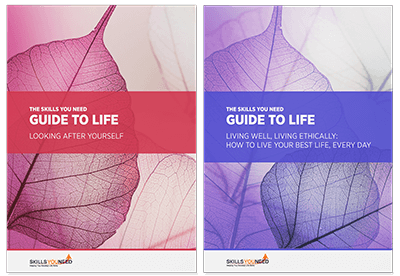Self-Compassion vs. Self-Esteem:
How to Boost Both Within You
See also: Personal Change Management
In the age of The Secret, online masterclasses and Snapchat psychology, there are a lot of 'self-' words being tossed around. Self-love, self-care, self-esteem, and self-compassion are all separate yet related concepts that have the potential to change the way you perceive yourself and how you move through the world.
But what are the differences between these concepts? Which one is most closely tied to success? And how can you improve your self-image?
Keep reading to find out.

Self-Love vs. Self-Care
The simplest way to explain the difference between these concepts is that self-love is a state of being and self-care is an action or series of actions that are often, but not always, motivated by that state of being.
Think of it this way: being hungry is a state of being that might motivate you to go get food. Self-love is the hunger. Self-care is going to get food.
Self-love requires you to look inward and examine what makes you feel valued emotionally, mentally, physically and spiritually. It means checking in with your body and asking what showing up for yourself looks like. Most importantly, it means treating yourself like someone you care about.
Think of someone you love dearly, like your mother or your child. Would it be OK with you if they were financially destitute? What if they stopped getting dressed every day? What if they were feeling angry or sad, would you ignore their feelings? Probably not. So, don't treat yourself that way either.
Self-compassion vs Self-esteem
Self-esteem, or your capacity to believe in your own inherent worth and have confidence in your own abilities, is a concept that most people are familiar with. However, you probably don't know much about self-compassion. What exactly is the difference between the two?
While self-esteem is about believing in what you can do, self-compassion is about being forgiving and empathetic towards yourself because of what you are, a human being with human shortcomings. Self-compassion doesn't require you to be on your 'A-game' or living your best life. It simply requires you to treat your own mistakes the way you treat the mistakes of others, to treat yourself with objectivity instead of obsessing over your shortcomings.
While developing a healthy sense of self-esteem and self-compassion are both important, one of these two qualities is more closely linked with success. Can you guess which one?
Self-Esteem and Success

Is self-esteem key to success? If not, how is self-esteem related to success?
Surprisingly, researchers have found that having high self-esteem is not a reliable predictor of improved work performance or financial success. In fact, studies have shown that people with high self-esteem are not necessarily healthier, sexier, better leaders or lovers than their low self-esteem peers.
One reason for this might be that self-esteem is based on believing in your abilities and celebrating your successes, which, if you think about it, can depend largely on your circumstances. Sure, it's easy to feel good about yourself when you're kicking butt and taking names, but what about when you are having a bad day, week, or even month?
Self-Compassion and Success
In contrast, treating yourself humanely doesn't depend on your circumstances. Whether you have done something to be proud of or not, you are still a human being who deserves to be treated with respect and dignity.
Self-compassion allows you to view your mistakes with objectivity and to be mindful of and process negative emotions instead of suppressing them.
Taking a realistic view of your flaws helps you to take corrective action towards self-improvement instead of wallowing in self-pity. Instead of agonizing over past decisions, you are better equipped to move forward and not make the same mistake twice. Highly successful people know that failure can be one of life's best teachers. Self-compassion allows you to learn from your failures, which makes it key to success.
How to Improve Your Self-Esteem and Self-Compassion
Of course, if you want to be a happy, well-adjusted person, you will need to develop both. But what if you don't know how to work on your self-esteem and self-compassion? Here are some tips to help you to improve your self-esteem and self-compassion:
1. Have a Gentle Self-Talk
Self-compassion researcher Dr. Kristen Neff says that self-kindness, a sense of common humanity and mindfulness are the main pillars of self-compassion. You can cultivate this by changing your self-talk.
When you make a mistake, feel sad or angry, or experience failure. Ask yourself, "What would I tell my mother or daughter if she came to me with this situation?" Pay attention to how your response to someone you care about differs from the way you talk to yourself inside your head. Practice being kind to yourself, even in your thoughts.
2. Observe Your Emotions and Tell Yourself ‘It’s Okay...’
No-one is perfect. We all know that. As humans, we will all make mistakes. It is important to accept our flaws and learn to say it’s okay to ourselves. This is not only a comforting word, but it is also fact. Honestly, it is actually okay for you to make mistakes.
The fact that you feel bad about what you did wrong proves that you are a human with emotions and guilt, which is the true nature of us humans.
Remind yourself that you are human and that’s why you make mistakes. Don't judge your emotions, instead observe them and respond to yourself in the same way you would respond to someone you care about.
3. Practice Mindfulness

It sounds like a cliché, but mindful meditation is one of the most beneficial things that you can do.
Mindfulness has long been known to have many benefits and improve mental health in general. You can choose to engage in mindful activities such as meditation and yoga, or take a mindful approach to other activities such as walking.
Meditation will teach you to be aware of the present without judgement or preconceived ideas about yourself. You can take negative thoughts and turn them into something more positive. You will have more room for growth as you won’t dwell on those negative emotions for too long.
4. Be Grateful
It is easy to compare ourselves and what we have, or don’t have, to those around us. It’s easy to see everyone around us sharing online the brilliant highlights of their life, and we end up making comparisons.
It is important to remember to be grateful for what you do have. Gratitude doesn't have to be saved for the “big” things in life. You can learn to appreciate little things in your everyday life first. Then, move on to be grateful for what made you who you are today. Learning to be grateful for what you have is a great way to improve self-esteem and self-compassion. This will also teach you to love those around you, not just yourself.
5. Do Good to Feel Good, Not to Please Someone Else
Focus on how you feel and keep doing something good to make yourself feel good.
You don’t need a whole lot of people in social media to see or praise you for what you do. What matters the most is how you feel about yourself.
Research suggests that improving the well-being of those around you will help to improve your own well-being.
Further Reading from Skills You Need
The Skills You Need Guide to Life
This two-part guide is an easy-to-read summary of the essential skills you need for a healthy mind and body.
The first eBook, Looking After Yourself, covers some of our most popular content and will help you to live a happier, healthier and more productive life.
The second eBook, Living Well, Living Ethically, considers how you can live your best life all the time. It helps you to answer the question: how can I avoid having too many regrets about my life?
Final Words
Developing self-compassion and self-esteem won't happen overnight, but if you remember to treat yourself like a person, celebrate your victories, and put your failures into perspective, you will be well on your way to becoming a highly successful and well-adjusted person.
About the Author
Paige Ellingson is a graduate in business and communication who now works as a content creator in SE Asia and enjoys writing about personal growth and startup.
This article about how to boost self-esteem and self-compassion comes courtesy of Open Minds, an Australian-based organisation committed to supporting people living with mental illness, disability or acquired brain injury.


